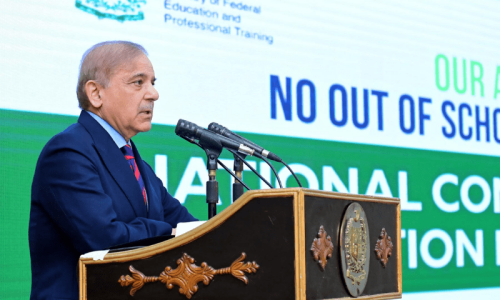ISLAMABAD: As the controversy over undeclared suspension of cellphone services and collapse of the much-touted Election Management System (EMS) deepened on Friday with the ECP unable to release complete results over 24 hours after the end of the polling, the caretaker government defended the decision, saying people’s lives were more important than voters’ mobility and early announcement of results.
The ECP, which earlier claimed the EMS also works offline, seemed helpless until Friday morning after voting ended.
After a complete silence for six long hours, the ECP said at 2.30am it had directed all provincial election commissioners and returning officers to declare all results within half an hour, warning that in case of failure strict action would be taken against them.
At 5.30am, it announced the chief election commissioner had personally contacted chief secretaries, election officials, directing them to ensure immediate announcement of results.
Interior minister says people’s lives more important than voters’ mobility, mobile coverage
Under Section 13 of the Elections Act, the ROs are supposed to compile complete results as soon as possible and transmit these electronically to the ECP.
Later in the day, caretaker Interior Minister Gohar Ejaz along with Information Minister Murtaza Solangi addressed a press conference to defend the government’s decision to suspend mobile phone service. He said the lives of people, including voters and polling staff, were more important than voters’ mobility and early results.
“There was no other motive but security of people. It was required and it was done,” he insisted.
The minister admitted that the ECP had not been taken on board, saying such decisions could not be shared for security reasons. He said the country was reeling from a sharp spike in terrorism and there were credible reports that terrorist entities, including the banned TTP and militant Islamic State group, were trying to create a serious law and order situation by attacking security agencies and civilians to shake the nation’s confidence and dissuade them from exercising their democratic right.
“A politically charged environment, a young electorate and public emotions getting out of hand were serious concerns impinging on the state’s decision making calculus,” he said.
In the run-up to the elections, Gohar Ejaz said the armed forces and other law enforcement agencies were proactively involved in intelligence-based counterterrorism operations. He said a number of terror incidents were reported in recent weeks. Just a day before polling, 28 people were martyred in terrorist attacks, he said, adding that it compelled the government to take drastict measures to ensure safety of people.
He said the election day saw 61 incidents of violence, including terrorist attacks across the country, claiming 16 lives.
The minister said the difficult decision to suspend mobile phone services was meant to prevent sabotage activities on election day. “We were fully aware that suspension of mobile phone services would impact the transmission of election results across the country and delay the process; but the choice between this delay and safety of our citizens was quite straightforward and the decision was taken,” he said.
Asked why the phone service remained suspended for many hours even after the polling ended, the minister said the purpose was to secure transportation of ballot boxes and protect the lives of polling staff as well.
Mr Ejaz said the results reflected the aspirations of millions of people who came out in record numbers to vote. “All major parties are generally satisfied with the results which also reflect the changing realities and the mood of the nation, all pointing towards the fact that elections were indeed free and fair,” he said.
Published in Dawn, February 10th, 2024
















































Dear visitor, the comments section is undergoing an overhaul and will return soon.